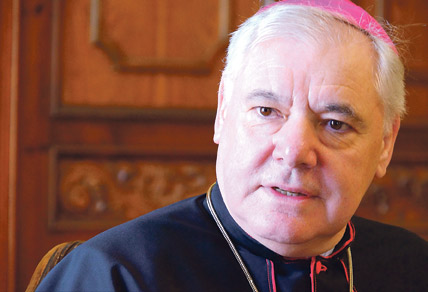Can the Roman Catholic Church faithfully engage the contemporary world with the love of God in Jesus Christ so that there is no distortion of the deposit of faith received from Christ and the apostles? The present pope’s declared desire to do just that is one of the most intensely followed issues today. One of the key men at the center of this drama is Gerhard Cardinal Müller, Prefect of the Roman Catholic Doctrine for the Congregation of the Faith, the Vatican office that defends and advances Catholic doctrine. He spoke at a public meeting at the Catholic University of America’s Caldwell Auditorium on November 3. He discussed general principles that should be utilized by the Congregation in defending church doctrine in the contemporary world.
Cardinal Müller jokingly said that he “has the honor of serving in one of the most popular positions in the Catholic Church.” He said that Pope Francis has recently clarified that Catholic doctrine should be “appealing” and “attractive,” but also “most necessary.” Received doctrine is to be interpreted and presented to the world by calling on the Holy Spirit for assistance, and in prayer. Cardinal Müller and the Congregation endeavor to “give attention to Holy Scripture,” in the “greatest care and holy fear.” After this, the Congregation is concerned with addressing “man and his mysterious destiny.” There must be a “reverence for truth,” but also “skill” in incorporating “new knowledge.”
The rise of post-modernism in the contemporary world “has dissipated objective truth,” into a variety of “truths,” Müller maintained. The statement of truth or formulations based on it are greeting with “suspicion,” as the aimed at the production of a power structure. It is believed that there is nothing beyond the human agent formulating the truth; “no transcending truth is common wisdom.” Müller noted that Pope Francis has held that this results in a situation in which everything comes under the rubric of “competition and survival of the fittest.” But “if there is no truth beyond suspicion, then there is no basis for human communication beyond the pragmatic.”
The most essential truth that the Catholic Church attempts to convey is that “truth is the beauty of the saving love of Jesus Christ who died and rose from the dead.” This essential core cannot be “mediated or ignored.” The function of the Catholic magisterium is not to supply truth, not to act “above” it, but arises from truth, Müller maintained. The task of the Church then is to “provide a persuasive account of the hope that is within us.” This hope must be known precisely, and “without exception or exclusion.” Moving beyond this, “there is an intrinsic newness to evangelization;” the Gospel is intrinsically “new and renewing.” The role of the evangelist is to renew the Gospel, while Pope Francis has said that “theologians should be pioneers.” In the resulting faith, Müller said that “dynamism can come from faith itself … not as an artifact to be preserved in a museum,” but comes as a gift from the “living God.”
A danger in this enterprise is the possibility of incorporating into doctrine “elements of discontinuation” with the received faith. The Church appreciates the “charism” of theologians to engage the world but must remember church is interested in evangelizing. The encounter between faith, reason, and science is assessed by the Church and becomes a tool of evangelization. However, “it may happen that the water of scientific study does not become wine, but remains water.” The magisterium must proceed with caution in “pioneering work.” There should be a willingness to listen to opinion which may seem to deviate from the “theological standard, ” but may actually be a new form of the true faith, Müller maintained. Theological doctrine can be modified by the magisterium, but cannot be rejected entirely. Non-irreformable magisterial teaching can be reformed, although it must be carefully done. The church must discern whether the unity of truth and charity is being broken, or whether changes can be accommodated within this unity.
Finally, Cardinal Müller discussed the impact of the mass media and social media on the formation of public opinion, including the views of Catholics. This, he said, is especially important with young people. He said that Pope Francis has called special attention to the negative effects of the media. This results in disorientation of youth and moral relativism. The media conveys much skepticism regarding church teaching. Christians are led to relativize or conceal Church teaching. This is inimical to human dignity. The magisterium has a role to play in protecting democracy from thoughtlessness. Democracy should function on the basis of respect for truth in general, not just religious truth. Truth should not be reduced to “scientific positivism.” “Unreflective” positivism is not the only way to think. Such thinkers as Nietzsche and Heidegger result from this way of thinking. It involves the “will to power” as an ultimate rule in the world, and conduces to totalitarian regimes. Defending revealed truth is thus a matter of obedience to God and preservation for the Church, but also a matter of sustaining freedom in the contemporary world.
No comments yet




